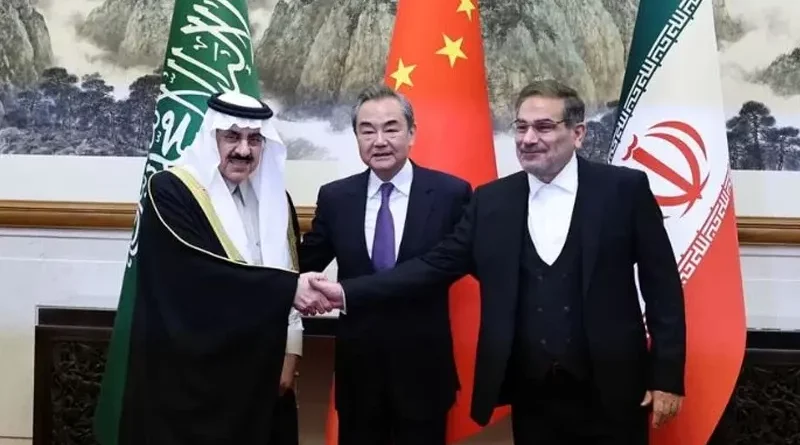‘End of American domination’: Mideast rivals Iran and Saudi Arabia restore ties
DUBAI/RIYADH: Iran and Saudi Arabia agreed on Friday to re-establish relations after years of hostility that had threatened stability and security in the Gulf and helped fuel conflicts in the Middle East from Yemen to Syria.
The deal, brokered by China, was announced after four days of previously undisclosed talks in Beijing between top security officials from the two rival Middle East powers.
Tehran and Riyadh agreed to resume diplomatic relations and re-open embassies within two months, according to a statement issued by Iran, Saudi Arabia and China. “The agreement includes their affirmation of the respect for the sovereignty of states and the non-interference in internal affairs,” it said.
Saudi Arabia cut ties with Iran in 2016 after its embassy in Tehran was stormed during a dispute between the two countries over Riyadh’s execution of a cleric.
The kingdom also has blamed Iran for missile and drone attacks on its oil facilities in 2019 as well as attacks on tankers in Gulf waters. Iran denied the charges.
Yemen’s Iran-aligned Houthi movement has also carried out cross-border missile and drone attacks into Saudi Arabia, which leads a coalition fighting the Houthis, and in 2022 extended the strikes to the United Arab Emirates.
Ashok Swain, a professor and columnist, who is known for his geopolitical commentary said: “American domination of Middle East politics officially comes to an end” with the restoration of peace between Iran and Saudi.
Friday’s agreement, signed by Iran’s top security official, Ali Shamkhani, and Saudi Arabian national security adviser Musaed bin Mohammed Al-Aiban, agreed to re-activate a 2001 security cooperation accord, as well as another earlier pact on trade, economy and investment.
China’s top diplomat, Wang Yi, described the deal as a victory for dialogue and peace, adding that Beijing would continue to play a constructive role in addressing tough global issues.
White House national security spokesperson John Kirby said Saudi Arabia had kept the United States informed about the talks in Beijing but Washington had not been directly involved. He said Washington had supported the process as promoting an end to the war in Yemen.
“This is not about China. We support any effort to de-escalate tensions in the region. We think that’s in our interests, and it’s something that we worked on through our own effective combination of deterrence and diplomacy,” Kirby said.
Long-standing strategic ties between Riyadh and Washington have been strained during President Joe Biden’s administration over the kingdom’s human rights record, the Yemen war and more recently ties with Russia and OPEC+ oil production.
In contrast, Saudi Arabia’s growing ties with China were highlighted by the high-profile visit of President Xi Jinping three months ago. Friday’s announcement came on the day Xi clinched a third term as China’s president amid a host of challenges.
SL Kanthan, who writes about geopolitics and global trends said that these restored ties could lead to the birth of a new powerful currency.
“Imagine a BRICS+ with three oil giants — Russia, Saudis and Iranians. How hard will it be create a new currency that’s backed by oil and gas?”

